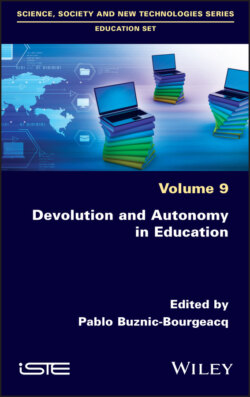Читать книгу Devolution and Autonomy in Education - Группа авторов - Страница 8
The concept of devolution
ОглавлениеBrousseau borrows the term devolution from legal vocabulary, formed from the Latin devolere (Medieval Latin), which means “to roll up and down”. In use today in political and administrative language, this expression is usually applied to the movement of transferring power from one jurisdiction, or even from the controlling authority, over the actions and resources associated with these responsibilities. Although inspired by the legal terminology applied to civil matters (law of succession), this concept used in the sphere of public affairs is generally used to refer to a top–down approach to subsidiarity, a subject that is now closely regulated in all rule of law regimes.
In his glossary, Guy Brousseau considers devolution a process that he defines as follows:
The process by which the teacher manages to place the student as a simple actant in adidactic situation […]. In this way, the teacher seeks to ensure that the student’s action is produced and justified only by the needs of the milieu and by his or her knowledge, and not by the interpretation of the teacher’s didactic procedures. For the teacher, devolution consists not only of proposing a situation to the student that should provoke in him or her an activity that has not been agreed previously, but also in making him or her feel responsible for obtaining the proposed result, and in accepting the idea that the solution depends only on the exercise of the knowledge he or she already possesses. The student accepts responsibility under conditions that an adult would not accept, because if there is a problem and then knowledge is created, it is because there is doubt and ignorance first. This is why devolution creates responsibility, but not guilt in the event of failure (see paradox of devolution). Devolution is the counterpart to institutionalization. These are the two didactic interventions of the teacher in the “pupil – milieu – knowledge” situation. It is an important sui generis element of the didactic contract (Brousseau 2003, p. 5)1.
He completes this definition in the article “le paradoxe de la dévolution”:
The teacher has a social obligation to teach everything necessary about knowledge. The student – especially when he or she is failing – asks the teacher to do so. So the more the teacher gives in to these requests and reveals what he or she wants, the more precisely the teacher tells the student what he or she needs to do, the more likely the student is to lose his or her chances of obtaining and objectively observing the learning that he or she is actually trying to achieve. This is the first paradox: it is not quite a contradiction, but knowledge and the project of teaching will have to advance behind a veil. This didactic contract thus puts the teacher before a real paradoxical injunction: everything he or she does to make the student produce the behaviors he or she expects, tends to deprive the latter of the conditions necessary for understanding and learning the targeted notion: if the teacher says what he or she wants, the student can no longer obtain it. However, the student is also faced with a paradoxical injunction: if he or she accepts that, according to the contract, the teacher teaches him or her the results, the student does not establish them himself or herself and therefore does not learn mathematics, does not master them. If, on the contrary, he or she refuses any information from the teacher, then the didactic relationship is broken. To learn implies, for him or her, that he or she accepts the didactic relationship but that he or she considers it provisional and tries to reject it (Brousseau 2003, p. 9).
In the following section, I will come back to some elements of these glossary articles, and first, I will attempt to characterize the terms “institutional knowledge” and “situational knowledge”, which Brousseau uses deliberately in the above articles.
